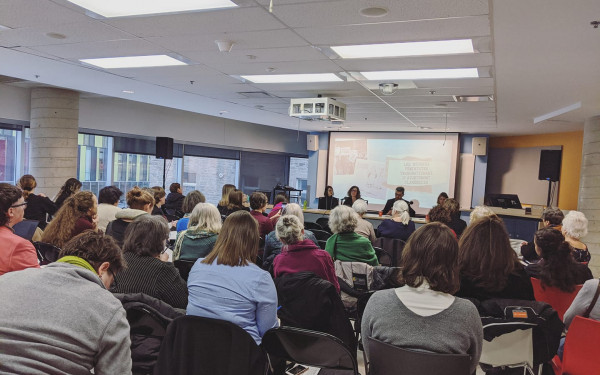Trans Rights Panel Hosts Discussion in Montreal
“Tonight we talk about the forgotten of the legal system,” said round table hostess Gabrielle Bouchard.
On the fourth floor of the Gouverneur Hotel in Montreal, approximately 50 trans activists and friends alike joined five panelists to discuss the current state of trans rights on Wednesday.
One of the panelists, 12-year-old Olie Pullen, said every time she crosses a border, “It’s like I’m forced to come out all over again” or “they think I am using someone else’s ID.”
Pullen appeared on the cover of Maclean’s last year for a story titled, “What Happens When Your Son Tells You He’s Really a Girl.”
This year’s Montreal Pride also marks the second year that the Québec trans community waits for the 2013 Bill 35 to come into effect. This law would exempt Quebecers from having to undergo a sex change operation in order to change their gender on legal documents.
For a trans migrant person, for example, the full transition is not necessarily an option, explained Betty Iglesisas, project manager at Action Santé Travesti(e)s et Transsexuel(le)s du Québec. Because of different status claims, trans migrants are on the “precarious side of the trans community,” Iglesias said.
Questions like “What do you identify as?” or “Did you have a sex change?” are still the norm, she continued. Access to healthcare and housing are increasingly difficult, explained Iglesias, since the gender marker on legal documents often don’t match the person’s self-identification.
The idea of “being born in the wrong body” is “the most well known perspective in the western and colonized world”, said McGill Masters student, artist and mental health worker Kai Cheng Thom. For Thom this is a way of saying that modern medicine can “fix” the problem and pushes to “hating” one’s body.
And while understanding the need for what some call the “transmedical excuse”, Thom said it’s important to understand that “transmedicalism” doesn’t need to be the only way we think of trans experiences.
Professor and trans youth specialist Annie Pullen Sansfaçon wants to remedy to the “contempt” associated with gender identity through recognition. “Affective, social and legal” needs have to be met in order to live a healthy experience, she said.
The professor pointed out that suicide rates decrease by 93 per cent if transgendered teenagers have a supportive family. She also said that it is important to see how the social “interlocks” with the personal and the legal with the societal.
Allowing trans people to legally change their status could help change society’s view of them and lead to acceptance. But the community is quite divided on this matter and some believe that removing the mention of gender altogether would be the best option yet, explained LGBT activist and writer Raoule Nadeau in his presentation on non-binary conceptions.
“We will not have a consensus,” said Thom, adding it is “the most vulnerable and most in need” who have to be accounted for first in the fight for trans rights.
Correction: In a previous iteration of this story, it incorrectly stated that Kai Cheng Thom’s last name was “Cheng.” It is Thom. The Link regrets the error.

_900_627_90.jpg)

_600_375_90_s_c1.jpg)
1_600_375_90_s_c1.jpg)

